|
|
|
Sort Order |
|
|
|
Items / Page
|
|
|
|
|
|
|
| Srl | Item |
| 1 |
ID:
185310
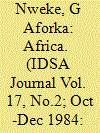

|
|
|
| 2 |
ID:
166018


|
|
|
|
|
| Summary/Abstract |
This article analyzes the way in which American politicians and experts debate the problem of denuclearizing the Korean Peninsula, is analyzed from the viewpoint of how likely it is that a consensus can be reached in the domestic politics of the United States. The views of the most influential groups of the American establishment in the Democratic and Republican parties are examined in the context of current events in the region. The authors conclude that since these views largely coincide with the denuclearization policy of President Donald Trump, the administration and Congress will reach a full consensus on this issue.
|
|
|
|
|
|
|
|
|
|
|
|
|
|
|
|
| 3 |
ID:
088242
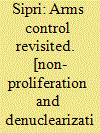

|
|
|
|
|
| Publication |
Warszawa, SIPRI, 2009.
|
| Description |
75p.
|
| Series |
WARSAW Papers and Reports Nov 20-21, 2008
|
| Standard Number |
9788389607621
|
|
|
|
|
|
|
|
|
|
|
|
Copies: C:1/I:0,R:0,Q:0
Circulation
| Accession# | Call# | Current Location | Status | Policy | Location |
| 054188 | 327.174/SIP 054188 | Main | On Shelf | General | |
|
|
|
|
| 4 |
ID:
176980


|
|
|
| 5 |
ID:
146545
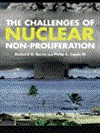

|
|
|
|
|
| Publication |
Lanham, Rowman and Littlefield, 2015.
|
| Description |
xvi, 238p.pbk
|
| Series |
Weapons of Mass Destruction Series; 2
|
| Standard Number |
9781442223752
|
|
|
|
|
|
|
|
|
|
|
|
Copies: C:1/I:0,R:0,Q:0
Circulation
| Accession# | Call# | Current Location | Status | Policy | Location |
| 058759 | 327.1747/BUR 058759 | Main | On Shelf | General | |
|
|
|
|
| 6 |
ID:
116032
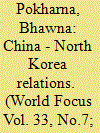

|
|
|
| 7 |
ID:
101601
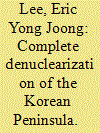

|
|
|
|
|
| Publication |
2010.
|
| Summary/Abstract |
The primary purpose of this article is to propose general conditions for establishing a nuclear weapon-free zone (NWFZ) in the Korean Peninsula from the viewpoint of international law. North Korea's nuclear weapons development has created the most negative environment for the peace and security of Northeast Asia since the early 1990s. In spite of painstaking negotiations to denuclearize North Korea, the parties concerned have not found any fundamental solution yet. This interim failure is due to the uncompromising positions of the two sides as well as the inherently paradoxical structure of the Treaty on the Non-Proliferation of Nuclear Weapons, which legalizes the development of nuclear weapons by the recognized nuclear powers. The most reasonable solution is to completely and fairly denuclearize the whole Korean Peninsula under an NWFZ. This paper scrutinizes legal, political and technical problems for realizing the plan for a nuclear-free Korean Peninsula.
|
|
|
|
|
|
|
|
|
|
|
|
|
|
|
|
| 8 |
ID:
080282


|
|
|
| 9 |
ID:
167946


|
|
|
|
|
| Summary/Abstract |
This paper analyzes the background of the nuclear stalemate between Trump and
Kim in the Hanoi Summit and investigates various issues involving North Korean
denuclearization, including a detailed roadmap and proper compensation for
Pyongyang. The paper uses tree cardinal perspectives of analytical tools (the will of
the leader, nuclear capability, and nuclear strategy) to critically assess North Korea’s
nuclear weapons program and fathom Kim Jong Un’s stance on denuclearization.
The United States reaffirms CVID/FFVD principles regarding North Korea’s
WMD, while Pyongyang prefers an action-for-action method of denuclearization.
Although Pyongyang has announced an end to its nuclear testing and has shut down
nuclear facilities, experts question whether Pyongyang really is dismantling its
nuclear program. Pyongyang’s hidden nuclear facilities and accumulation of HEU
in numerous places, the complicated process of verification, as well as potential
traps in the details of the denuclearization agreement pose a big challenge. In light
of the current nuclear stalemate, President Moon’s mediating effort to bring Kim
Jong Un back to the denuclearization table is imperative.
|
|
|
|
|
|
|
|
|
|
|
|
|
|
|
|
| 10 |
ID:
083610
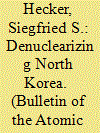

|
|
|
| 11 |
ID:
108542
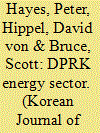

|
|
|
|
|
| Publication |
2011.
|
| Summary/Abstract |
This report discusses the history, current status, and potential future of the DPRK
energy sector. The authors, drawing on the Nautilus Institute's decades of work
on North Korea, describes the history of the DPRK energy sector, in particular
changes in the sector since 1990. The study then looks at the current status and
supply and demand balance of North Korea's energy sector noting the vulnerabilities and critical needs of that sector. The report also explores options for the
rehabilitation of the DPRK energy sector that could be used in negotiations with
North Korea as part of a "roadmap" to denuclearization and legitimate energy
needs if negotiations are not successful and the DPRK either collapses (due to an
internal coup, succession crisis, or war) or continues to stagnate. The report concludes by identifying the robust strategies that are important in both engagement
and non-engagement (collapse or stagnation) scenarios.
|
|
|
|
|
|
|
|
|
|
|
|
|
|
|
|
| 12 |
ID:
130261
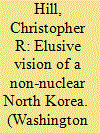

|
|
|
|
|
| Publication |
2013.
|
| Summary/Abstract |
Any president1 at the start of a new term will survey international problems and find a few requiring urgent attention. Some will be new, perhaps even emerging after the 2012 political campaign, but others are like hardy perennials, returning year after year. In 2013, one of these problems is North Korea and its aspirations to be a nuclear weapons state. The longer the problem of North Korea's nuclear issue remains, the more the world becomes inured to it, and might become inclined to live with it. North Korea's ambition to develop nuclear weapons, however, is a threat to peace and security-especially in the region. If successful in developing a deliverable nuclear weapons system (i.e. miniaturized and integrated with a working missile), North Korea would make a mockery of the already struggling nuclear Non-proliferation Treaty (NPT), as well as invite a regional arms race.
|
|
|
|
|
|
|
|
|
|
|
|
|
|
|
|
| 13 |
ID:
166009


|
|
|
|
|
| Summary/Abstract |
The main goal of this article is to explain the American failure of deterring North Korean nuclear proliferation. Specically, it examines the underlying reasons for which U.S. inhibition policy toward North Korea has failed, despite the numerous attempts by U.S. administrations (both Republicans and Democrats) to prevent North Korea’s nuclear development. The central thesis of the article is that while there were multiple reasons for the American failure of North Korean proliferation, the most important ones were U.S. misperceptions about both North Korea’s and China’s intentions and U.S. distraction by the war on terror. These factors, along with Pyongyang’s shrewd strategies to manipulate Washington, Seoul, and Beijing, played a key role in the emergence of a nuclear North Korea.
|
|
|
|
|
|
|
|
|
|
|
|
|
|
|
|
| 14 |
ID:
104995
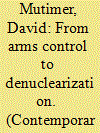

|
|
|
|
|
| Publication |
2011.
|
| Summary/Abstract |
On 5 April 2009, US President Barack Obama spoke in the Czech Republic, and the speech included the following quite extraordinary pledge: 'So today, I state clearly and with conviction America's commitment to seek the peace and security of a world without nuclear weapons.' Obama renewed the commitment the United States had first made formally by ratifying the Nuclear Non-Proliferation Treaty, to work towards nuclear disarmament, and went further to indicate that the means he would use to reach that goal, in the first instance, would be bilateral arms control negotiations. This article explores the relationship between the practice of negotiated, bilateral, nuclear arms control, and the goal Obama has so clearly set of reaching a world without nuclear weapons. It argues that arms control, understood as a social practice, is ill-suited to the pursuit of nuclear disarmament; that while arms control can produce limits and even reductions in nuclear weapons, it works against the overall elimination of arms. It then sets the practice of bilateral nuclear arms control in the context of the governmental rationality, or governmentality, elaborated by Michel Foucault to argue that nuclear arms control is a governmental technology, rooted much deeper than simply a Cold War diplomatic practice. From there, the article shows that the initial products of Obama's pledge, notably the New START Treaty are another instance of this governmental practice, before concluding with some thoughts on the way towards denuclearisation without passing through Cold War arms control.
|
|
|
|
|
|
|
|
|
|
|
|
|
|
|
|
| 15 |
ID:
158052
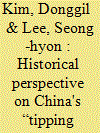

|
|
|
|
|
| Summary/Abstract |
The view that China would not “abandon” North Korea, despite repeated provocations by North Korea, has been strengthened in the context of the US pivot to Asia, which is generally regarded by Chinese strategists as Washington's ploy to contain China. As the rivalry and competition between Washington and Beijing deepen, North Korea's strategic value to China increases. However, history shows that Beijing regarded Pyongyang as “expendable” even during the Korean War. Based on Sino–North Korean historical relations, in this article we argue that China's policy toward North Korea is not fixed but fluid, and that Washington and Seoul could inspire changes within China's policy toward North Korea.
|
|
|
|
|
|
|
|
|
|
|
|
|
|
|
|
| 16 |
ID:
166008


|
|
|
|
|
| Summary/Abstract |
In light of a second Kim–Trump summit this article reviews the posture of Russia and China and suggests that not only do they have an alliance but that it also includes to some degree North Korea. Moscow and Beijing have endorsed Pyongyang’s negotiating posture and much evidence suggests a Russo–Chinese alliance, albeit an informal one. Such an alliance possesses immense implications for the ongoing efforts to nd a negotiated path out of the Korean nuclearization crisis and for regional security in general. But in the meantime the advent of such an alliance imparts a quality of regional bipolarity to the Northeast Asian security agenda that could obstruct further progress towards peace.
|
|
|
|
|
|
|
|
|
|
|
|
|
|
|
|
| 17 |
ID:
160347


|
|
|
|
|
| Summary/Abstract |
Recently, the international audience is interested in finding cases of denuclearization
in the past to draw out lessons that can be applied to North Korea. In order to
find the optimal reference point, it is crucial to carefully examine the background
of North Korea’s decision to begin denuclearization talks. Thus, this paper will
begin by discussing the overall context of the talks and highlight core issues that
may occur during the process of denuclearization. Next, it will examine which
case is most relevant to the negotiations with North Korea, and will analyze key
implications of Iran’s nuclear deal, which is the most recent and similar to the case
of North Korea. And by focusing on the core issues identified, it will suggest policy
considerations for preparing strategies to continue negotiations with North Korea.
|
|
|
|
|
|
|
|
|
|
|
|
|
|
|
|
| 18 |
ID:
106725


|
|
|
|
|
| Publication |
2011.
|
| Summary/Abstract |
It has become apparent that a policy of isolation, sanctions, lack of dialogue, and 'strategic patience' has not worked to weaken North Korea or alter its behavior, much less bring the regime down.
|
|
|
|
|
|
|
|
|
|
|
|
|
|
|
|
| 19 |
ID:
174443
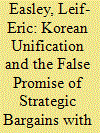

|
|
|
| 20 |
ID:
020074


|
|
|
|
|
| Publication |
July 2001.
|
| Description |
375-394
|
|
|
|
|
|
|
|
|
|
|
|
|
|
|
|
|
|
|
|
|